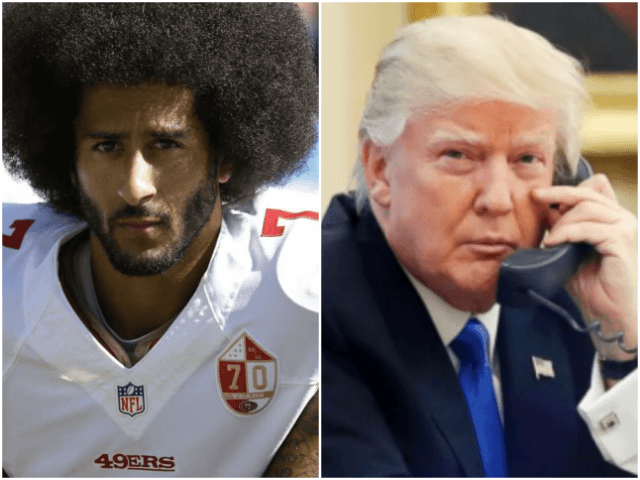Calling it “hollow,” ESPN host Jemele Hill slammed President Trump’s decision to invite Colin Kaepernick to a race summit in Washington.
Saying, “Let’s not forget how much the president seemed to take a special delight in helping to torpedo the quarterback’s NFL career,” in a May 7 op-ed Hill scoffed at the inclusion of Kaepernick in the president’s discussion on racial tension in America.
Last week, it was reported that President Donald Trump was considering offering Kaepernick an invite to his upcoming summit on race in America. The same reports noted that Trump might also invite rapper Kanye West, who has recently been in the news for bucking the liberal narrative.
However, the invitation of Kaepernick, who has remained unsigned since he turned free agent at the end of the 2016 NFL season, did not sit well with the outspoken ESPN writer.
In her op-ed, Hill noted that when Trump began attacking Kaepernick in March of 2017 she “felt certain that Colin Kaepernick would never play in the NFL again.”
Hill went on to say she feels the invitation for Kaepernick “rings especially hollow.”
“There is something to say for Trump seeking greater understanding of complex racial issues,” Hill wrote, “especially considering he has often come off as dismissive of the impact of racism on marginalized people and seemingly revels in encouraging intolerance.”
Though, Hill was not ready to believe the president’s sincerity:
But we’re a long way from giving Trump a cookie, as it can’t be forgotten how much Trump seemed to take a special delight in helping to torpedo Kaepernick’s NFL career.
Even before he was president, Trump used Kaepernick and the NFL player protests like a racial chew toy, stoking his base with consistent and frequent attacks on the NFL and Kaepernick.
Hill then pointed out that Trump continued to use Kaepernick and the NFL as a rallying issue by referring to the protesting players as “sons of b****es.”
Hill also believes that Trump “hijacked” Kaepernick’s message:
Trump hijacked Kaepernick’s original message — which was never about disrespecting the anthem, but rather holding this nation accountable for subjugating people of color to oppressive systems — and helped turn Kaepernick into public enemy number one.
So unless the president is willing to admit how much his words have contributed to Kaepernick being seemingly blackballed by the NFL, how could Kaepernick and Trump even begin to have a truly open conversation about race?
It is hard to square Hill’s claim that Kaepernick never intended to disrespect the nation and the anthem, though. In his own words, Kaepernick said he could never stand in honor of America. He also said the U.S.A. was never a great nation.
In August of 2016, for instance, Kaepernick said, “I am not going to stand up to show pride in a flag for a country that oppresses black people and people of color. To me, this is bigger than football, and it would be selfish on my part to look the other way. There are bodies in the street and people getting paid leave and getting away with murder.”
That quote seems quote clear that he does not respect the anthem or the country.
Hill next insisted that Colin Kaepernick could not gain any benefit from having a dialogue with the president:
I’m sure an argument will be made that perhaps if Kaepernick explains to Trump personally why he began his protests, it could persuade Trump to either soften his criticism or stop it altogether. A meeting with Trump could also get Trump’s base, many of which are NFL fans, to dial down their vitriol toward Kaepernick. And maybe that persuades an NFL owner that he can sign Kaepernick without facing intense backlash.
That’s a nice theory, but it’s not really rooted in reality. You can’t blame Kaepernick or any athlete who has opposed Trump and his administration for viewing this invitation skeptically.
Hill also slammed the president’s choice to invite musicians and athletes, “instead of people of color who have immense expertise and experience in examining race.”
“My concern is that this summit is just a front to exploit the players and artists for their popularity. They’ll become a talking point or a campaign strategy, used as evidence that some of the intolerance we’ve witnessed from this administration isn’t so bad,” she said.
Hill also criticized Rev. Darrell Scott, a Cleveland pastor and the man speaking for the president on the race summit, for criticizing blacks who won’t participate.
“A lot of people have spunk and courage on Twitter,” Hill noted that Scott said recently, “I wonder how many will actually show up.”
Wrapping up her op-ed, Hill agreed that it would take a gathering of people who usually don’t speak to each other to give the nation the “slightest chance at racial healing.” But she still sees no way forward with President Trump involved:
But it’s not that simple in this case. Trump has spent a lot of time attacking and criticizing Kaepernick without ever acknowledging or addressing Kaepernick’s concerns. Kaepernick, who recently received Amnesty International’s prestigious Ambassador of Conscience Award, has done the work.
“Can the president say he’s done the same?” Hill concluded.
Follow Warner Todd Huston on Twitter @warnerthuston.

COMMENTS
Please let us know if you're having issues with commenting.